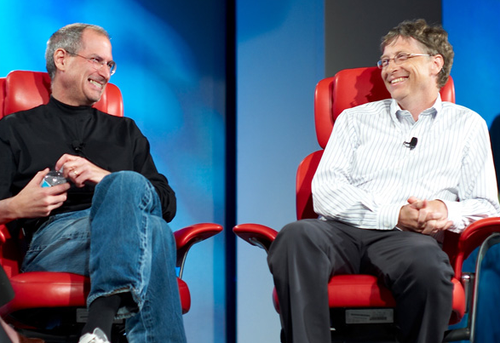
I am a PC as well as a Mac user. I use many of Apple’s inventions: MacBook, iPod, iPhone, iPad, and iTunes. These are good products. I once wore an Apple T-shirt to a 7/11 store and the storekeeper said he is an Apple user too. “Oh, these products are so good that only thunder can cause a crash.” Yet when Steve Jobs passed away, the cult he had developed is leading one to wonder the real legacy he has left if we leave design and functionality temporarily aside.
Jobs was named one of the greatest innovators of our time by President Obama. Many consider him to be a greater technologist than Bill Gates. It is not always a good idea to draw parallels between Bill Gates and Steve Jobs, but since much of their territories overlap, it is difficult not to see one in terms of the other.
Jobs seemed to be the cool guy, more popular among younger generations of technology users. Think for a moment: what has his coolness and popularity amount to for us as users? Bill Gates, with his Microsoft products, left us more productive and efficient with writing (Word), speaking (PowerPoint) and number crunching (Excel). With these tools we can produce something useful. Jobs tapped into our inner urge to have fun by luring us into the wonderland of instant gratification where the boundaries of work and entertainment collapse in our palms. Yes it is our fault for wanting to multitask or multislack, and yes there are productive uses of many apps that promise to enrich us in all facets of life. However, each facet can be fragmentized and diluted, as the temptation is high to move on from one thing to another with the ease his products provide. We all know that at times we have to move beyond the illusion that work is play, to draw lines around different spheres of our lives for some necessary boundaries.
Gates is by far a greater visionary who succeeds in diving into our potential needs, while Jobs taps into our wants. Jobs leads in his innovation by following where the crowd wants to go. For a time, Jobs refused to enter the field of e-reading because he believed people would not read much in text format, until Kindle emerged, after which truckloads of books were shipped to Apple factories for scanning, not necessarily due to a conversion to the belief in literacy, but because there is a big pie out there someone else is eating.
Jobs was a good marketer, but not necessarily a great innovator. Malcolm Gladwell wrote in a recent issue of the New Yorker that Jobs’ genius is in tweaking someone else’s products, including Word into Pages, and PowerPoint into Keynote, and Excel into Numbers, though he could get rather nasty when someone else is trying to do the same, such as creating an Android phone using the same touchscreen concept he thinks only he can claim.
As the names of his products seem to suggest, the man was wrapped around himself into a small package, vehemently defending his own little “i” world of business, epitomized by the Apple headquarter that he built before his death. His “i” world is also too closed for the greater good. I can understand the need for copyright protection not to share iTunes libraries, but as an inconvenienced user, I really cannot see the wisdom or good will in the petty fight to keep an innocent Flash out of his products.
Jobs was a capitalist who didn’t spend more time with philanthropy, which happens to be Gates’ passion. One could argue that this is just a personal choice no one should point a finger at. However, like salt of the world, wealth gives taste only when it is spread out and it will not do much good when it is piled together. There is a saying in Chinese that one of the greatest tragedies in life is that you die before you get a chance to spend all your money. Samuel Johnson also says that “ it is better to live rich than to die rich. ” Both become footnote to Steve Jobs’ life.
Popular as he is, I do not see Jobs as ever having the kind of impact that Gates is having (and will continue to have through his foundation) by making most of his wealth available to cure malaria, polio, or better lavatories in the developing world. Is this just a flash-in-the-pan urge of a capitalist to use his money in order to feel good? Without some deep-seated belief, no sentiments will drive one to give up 95% of his wealth to build a foundation for the greater good. I trust that Gates and his wife truly believe “everyone deserves the chance to live a healthy, productive life.”
As the Jobs fever continues, allow me to challenge today’s youths to model Gates, not Jobs, so that the world will not be littered with Jobs wannabes who cannot innovate and will not care. As an entrepreneur, Jobs may be doing his job, but Gates opens gates for many. If life is measured by impact, then Gates is by far a much greater hero of our times.
0
推荐




 京公网安备 11010502034662号
京公网安备 11010502034662号 